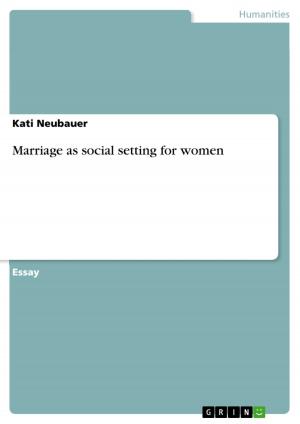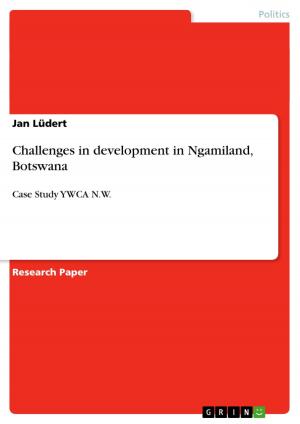Iraqi-Kurdistan. Does the Kurdistan Regional Government have a Foreign Policy?
Nonfiction, Social & Cultural Studies, Political Science, International, International Relations| Author: | Hêvi Sari | ISBN: | 9783656757474 |
| Publisher: | GRIN Publishing | Publication: | September 30, 2014 |
| Imprint: | GRIN Publishing | Language: | English |
| Author: | Hêvi Sari |
| ISBN: | 9783656757474 |
| Publisher: | GRIN Publishing |
| Publication: | September 30, 2014 |
| Imprint: | GRIN Publishing |
| Language: | English |
Seminar paper from the year 2014 in the subject Politics - International Politics - Region: Near East, Near Orient, grade: 1,3, University of Hamburg, language: English, abstract: After the Iraq War in 2003 the Kurds in Iraq became more and more important for the region, and there has been a shift of their international recognition. Kurds are now, not only noticed as the victims of their hard history of oppression and misery by their occupiers, but are also noticed, as actors on their own, since the establishment of the Kurdistan Regional Government. The Question whether the KRG has a Foreign Policy or not has come up when the US diplomat Ricciardone neglected that there was a US Foreign Policy towards the Kurds. But after 2003 there has been a strong development in the KRG and its relations to other states. In order to answer the question about Foreign Policy, first it should be looked at how the term is generally understood: 'Foreign policy [...]can be characterized as the sum of official external relations conducted by an independent actor (usually a state) in international relations' (Krieger 2001 ). When transferring this definition to the KRG, first one has to be aware, that the KRG is not legally a state on its own, but is a autonomous, federated state within the Iraqi state. The first Chapter of this work will therefore look at the structural conditions of the Kurdistan Region. Afterwards in order to understand how the KRG was established, it will be looked at the historical development of the KRG from 1992 onwards, and especially after the Iraq War in 2003. In the following chapters it will be concentrated on whether the KRG can , besides the structural and historical facts, de facto be understood as an independent actor and how it is recognised as such. Therefore it will be looked in dependence of Hinnebusch, at the role of Identity in the Politics of the Middle East and to what extend this shapes the development in the KRG. On the other hand it will be closer looked at the idea of Sovereignty in International Relations, considering that the general understanding of the term is difficult to use in the Middle East, and specifically in the Kurdistan Region. In a last step it will be looked at the external relations of the KRG, examining its relations to the US Government and Turkey, which both play a major role in the development of the region. [...]
Seminar paper from the year 2014 in the subject Politics - International Politics - Region: Near East, Near Orient, grade: 1,3, University of Hamburg, language: English, abstract: After the Iraq War in 2003 the Kurds in Iraq became more and more important for the region, and there has been a shift of their international recognition. Kurds are now, not only noticed as the victims of their hard history of oppression and misery by their occupiers, but are also noticed, as actors on their own, since the establishment of the Kurdistan Regional Government. The Question whether the KRG has a Foreign Policy or not has come up when the US diplomat Ricciardone neglected that there was a US Foreign Policy towards the Kurds. But after 2003 there has been a strong development in the KRG and its relations to other states. In order to answer the question about Foreign Policy, first it should be looked at how the term is generally understood: 'Foreign policy [...]can be characterized as the sum of official external relations conducted by an independent actor (usually a state) in international relations' (Krieger 2001 ). When transferring this definition to the KRG, first one has to be aware, that the KRG is not legally a state on its own, but is a autonomous, federated state within the Iraqi state. The first Chapter of this work will therefore look at the structural conditions of the Kurdistan Region. Afterwards in order to understand how the KRG was established, it will be looked at the historical development of the KRG from 1992 onwards, and especially after the Iraq War in 2003. In the following chapters it will be concentrated on whether the KRG can , besides the structural and historical facts, de facto be understood as an independent actor and how it is recognised as such. Therefore it will be looked in dependence of Hinnebusch, at the role of Identity in the Politics of the Middle East and to what extend this shapes the development in the KRG. On the other hand it will be closer looked at the idea of Sovereignty in International Relations, considering that the general understanding of the term is difficult to use in the Middle East, and specifically in the Kurdistan Region. In a last step it will be looked at the external relations of the KRG, examining its relations to the US Government and Turkey, which both play a major role in the development of the region. [...]















